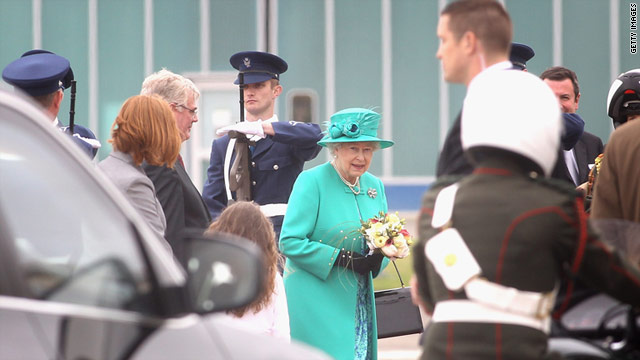
Queen Elizabeth II arrives in Ireland Tuesday, the first British monarch to visit the country since it gained independence in 1921.
Dublin, Ireland (CNN) -- Queen Elizabeth II arrived in Ireland on Tuesday, the first UK monarch to visit the country since it gained independence in 1921.
The queen, accompanied by the Duke of Edinburgh, was then escorted to Aras an Uachtarain, President Mary McAleese's official residence, where the British national anthem God Save the Queen and Amhrann na bhFainn, the Irish national anthem, were played in the grounds.
A 21-gun salute and an Air Corps flypast also greeted the queen.
President McAleese has developed a good relationship with the queen and has visited Buckingham Palace, the queen's official residence in London, on a number of occasions, say royal experts.

Irish PM: We welcome the queen

Who's behind Irish security threats?

Bomb defused ahead of Queen's visit
Professor Ronan Fanning of University College Dublin said: "The queen and President McAleese have had a personal relationship which has grown over the years. This is a state visit but also inter-governmental, an indication of its significance."One of her first official engagements Tuesday will be a wreath-laying ceremony at the Garden of Remembrance in Dublin which honours those who fought for Irish freedom from British rule.
The visit has prompted police to mount one of the biggest-ever security operations in the history of the Irish state amid growing threats of dissident republican violence.
The Irish military defused a bomb Tuesday on a bus headed to Dublin. The military stopped a private bus in Maynooth, evacuated the passengers and found a "viable device" in the luggage compartment of the bus early Tuesday morning, a spokesman for the Irish national police said.
Later Tuesday morning, Irish authorities raced to the scene of a second suspicious device -- but it was later determined to be a hoax. Authorities responded to at least one report of a suspicious package in Belfast, Northern Ireland.
Irish lawmaker: Queen unwelcome
The queen's visit is one that many in Ireland believed would never happen, and will mark the reconciliation between two neighboring countries that once viewed each with suspicion and hostility.

Queen Elizabeth's controversial visit

Ireland preps for queen's visit

Are more threats likely in Ireland?
Ireland's fight to free itself from its former imperial master is likely to form much of the narrative of the visit, the first by a UK monarch to the republic since it gained independence in 1921.There will be constant reminders of the violent past. Her plane touched down for example at Casement Aerodrome, a military airfield named after Roger Casement, who was executed for treason in 1916 for conspiring with the Germans. His fate was sealed when the queen's grandfather George V refused to commute his death sentence.
Like all foreign heads of state, the queen will then go to Dublin's Garden of Remembrance where she will pay her respects alongside McAleese to "all those who gave their lives in the cause of Irish Freedom."
She will travel to another nationalist shrine, Croke Park, where British troops opened fire on a crowd watching a Gaelic football match in November 1920, killing 14. The massacre was sparked by the murder of 14 British intelligence officers by the IRA.
The Irish war of Independence that the killing was a part of directly led to partition of Ireland in 1921. The majority of the island gained independence but six of the nine counties of the province of Ulster chose to stay in the United Kingdom, eventually becoming the country of Northern Ireland.
In the late 1960s the conflict between mainly Protestant unionists who want Northern Ireland to remain part of the UK and largely Roman Catholic nationalists who want the North to be reunited with the rest of Ireland exploded into a political and sectarian war, known as the Troubles.
The three decades of ensuing violence between the IRA and loyalists claimed the lives of more than 3,000 people, most of them north of the border, and while the Good Friday Agreement effectively ended the conflict, suspicions remain, and for this reason the queen's state visit is more than symbolic.
Under the terms of the landmark accord, terrorist groups on both sides dumped their weapons, and political allies of both sides now work together in Northern Ireland's power-sharing government.
The change has been so rapid that even as recently as the late 1990s one journalist said he could never have imagined a state visit by the queen. Toby Harnden, who covered Ireland for the Daily Telegraph, said while some people on both sides still have their doubts over it -- for different reasons -- more significant is the peaceable language used in the debate.
"Some Catholics will see this as Britain cementing its claim over the Irish territory of the six counties of Northern Ireland," Harnden told CNN.
Meanwhile "the Protestants will see the queen's visit as ratification of a state that they believe is constitutionally hostile to any British presence in Ireland. So on both sides there'll be qualms."
But the comment by Gerry Adams -- a pivotal figure in Northern Irish history as long-time leader of Sinn Fein, the IRA's political allies -- who said the queen's visit was "premature" speaks volumes, Harnden said, compared to incendiary language he had used in the past.
For instance, "when the queen's cousin Lord Mountbatten was killed by the IRA in 1979 (Adams) said it was an execution that was fully justified."
"When I was there the IRA cease-fire had collapsed, there was violence and killings, no surrender, no compromise. In those days there was no likelihood of the queen ever visiting."








0 comments